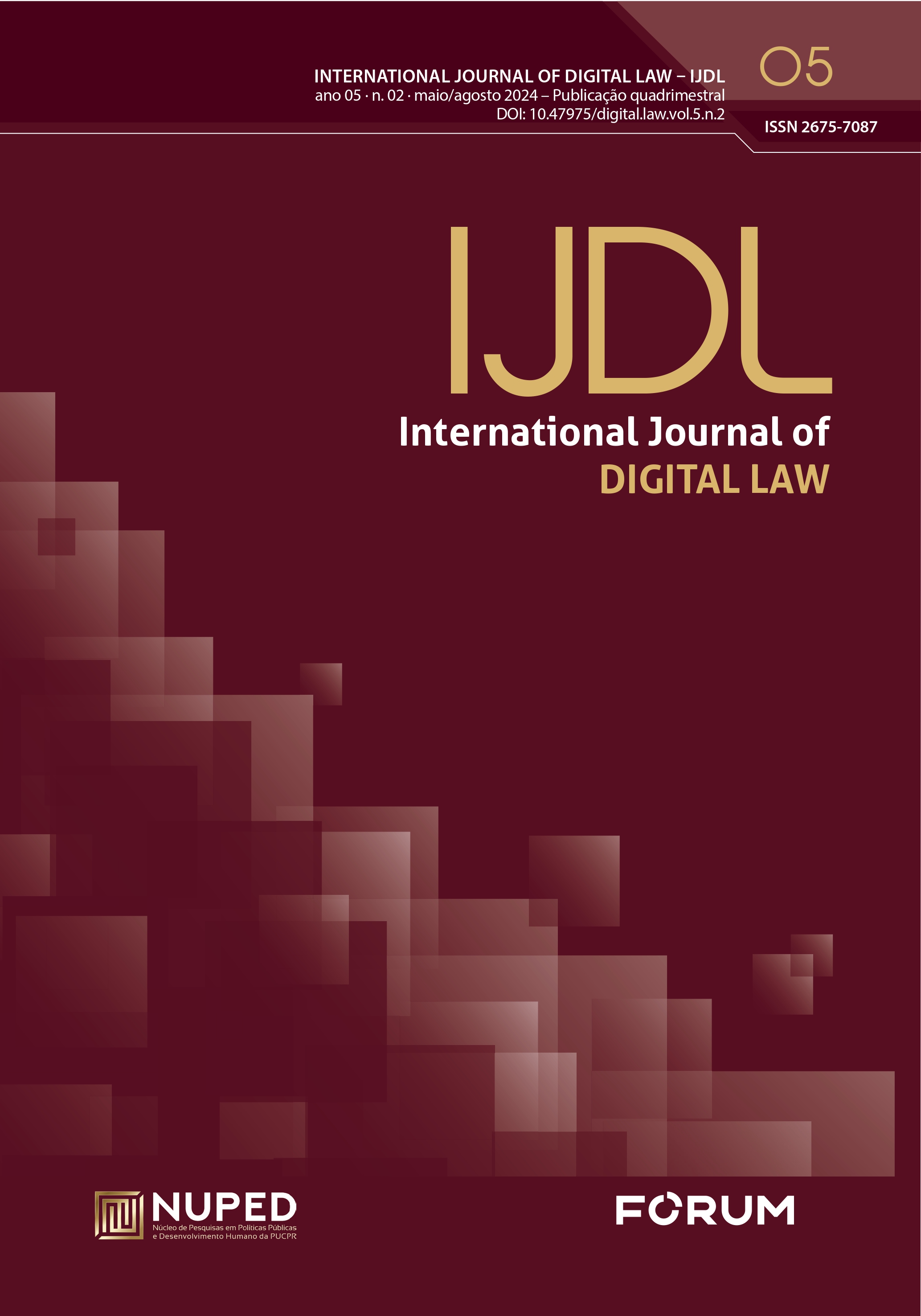Smart contracts: the new method of interaction between the law and technology
DOI:
https://doi.org/10.47975/digital.law.vol.5.n.2.nieblaKeywords:
Artificial intelligence; contracts; artificial legal reasoning; legal informatics; digital platforms.Abstract
Technology has reshaped the law. The Internet and derived technologies have led to the adaptation of traditional legal figures with the objective of bringing certainty to users and developers. A field that has been subject of constant technological development is contact law. This paper will address this scenario from the perspective of smart contracts, which allows not only a digital representation of the obligations agreed by the parties, but also the capacity to solve discrepancies to ensure operation. Finally, this joint approach offers compatibility with transactions that take place in digital scenarios, contributing to a safer and law compliant cyberspace.Downloads
References
ALHARBY, M.; VAN MOORSEL, A. Blockchain-based smart contracts: A systematic mapping study, in International Conference on Cloud Computing, Big Data and Blockchain (ICCBB), 2018, p. 2.Conference on Cloud Computing, Big Data and Blockchain (ICCBB), 2018. DOI: https://doi.org/10.1109/ICCBB.2018.8756390
BALLY, Cryptocurrencies accepted by Switzerland’s biggest online retailer, available in https://www.swissinfo.ch/eng/bitcoin-or-cash_cryptocurrencies-accepted-by-switzerland-s-biggest-online-retailer/44835480
CLACK, C. D.; BAKSHI, V. A.; BRAINE, L. Smart contract templates: foundations, design landscape and research directions, in Cornell University, 2017.
COPPOLA, F. Ethereum’s DAO Hacking Shows That Coders Are Not Infallible, 2016.
DUGGAL, P. Blockchain Contracts & Cyberlaw, in New York, 2015.
EUROPEAN COMISSION, Legal and regulatory framework of blockchains and smart contracts thematic report, in EUBlockchain, 2019.
GOVERNATORI, G.; IDELBERGER, F.; MILOSEVIC, Z.; RIVERET, R.; SARTOR, G.; XU, X. On legal contracts, imperative and declarative smart contracts, and blockchainsystems, in Artificial Intelligence and Law 26 (4), 2018. DOI: https://doi.org/10.1007/s10506-018-9223-3
HVITVED, T. “Contract formalisation and modular implementation of domain-specific languages”, in Doctoral dissertation, PhD thesis, Department of Computer Science, University of Copenhagen, 2011.
LADLEIF, J.; WESKE, M. A Unifying Model of Legal Smart Contracts, in International Conference on Conceptual Modeling Springer, 2019. DOI: https://doi.org/10.1007/978-3-030-33223-5_27
LESSIG, L. Code is law, in Harvard Magazine, 2000.
LONG, C. What Do Wyoming’s 13 New Blockchain Laws Mean?, available in: www.forbes.com/sites/caitlinlong/2019/03/04/what-do-wyomings-new-blockchain-laws-mean.
MADIR, J. Smart Contracts (How) Do They Fit Under Existing Legal Frameworks?, 2018. DOI: https://doi.org/10.2139/ssrn.3301463
STARK, J. Making sense of blockchain smart contract, in coindesk, https://www.coindesk.com/making-sense-smart-contracts.
STEEMIT, An Open Letter to the DAO and the Ethereum Community, in https://steemit.com/ethereum/@chris4210/an-open-letter-to-the-dao-and-the-ethereum-community.
SWAN, M. Blockchain: Blueprint for a new economy, in O'Reilly Media, Inc. 2015.
SZABO, N. Formalizing and securing relationships on public networks, in First Monday, 1997. DOI: https://doi.org/10.5210/fm.v2i9.548
United States Trade Representative, Office of, “Agreement between the United States of America, the United Mexican States, and Canada 12/13/19 Text”, in https://ustr.gov/trade-agreements/free-trade-agreements/united-states-mexico-canada-agreement/agreement-between
VOSHMGIR, S. What Is the Token Economy? In O'Reilly Media, Incorporated. 2019.
WANG, S.; OUYANG, L.; YUAN, Y; NI, X; HAN; WANG, F. Y. Blockchain-enabled smart contracts: architecture, applications, and future trends, in IEEE Transactions on Systems, Man, and Cybernetics: Systems, 49(11), 2019. DOI: https://doi.org/10.1109/TSMC.2019.2895123
WOOD, G. Ethereum: A Secure Decentralised Generalised Transaction Ledger Shanghai Version 47e97f5 – 2024-08-26. Ethereum & Parity, 2018, available at: https://ethereum.github.io/yellowpaper/paper.pdf, last access on the 27th of August 2024.
WRIGHT, C.S. Turing Complete Bitcoin Script White Paper, in SSRN 3160279.
WU, T. When code isn’t law. Virginia Law Review, 2003. DOI: https://doi.org/10.2139/ssrn.413201
Downloads
Published
How to Cite
License
Copyright (c) 2024 Jesus Manuel Niebla Zatarain, Paola Jackeline Ontiveros Vázquez (Autor)

This work is licensed under a Creative Commons Attribution 4.0 International License.
This journal is licensed by
Creative Commons Attribution-NonCommercial-4.0 International.
Attribution-ShareAlike 4.0 International (CC BY-NC 4.0)
Submission and publication of paper are free; Works evaluated by blind double review; the Journal uses S_cites and CrossCheck (anti-plagiarism); and complies with the COPE Editors Guide - Committee on Publication Ethics, in addition to the Elsevier and SciELO recommendations.
















